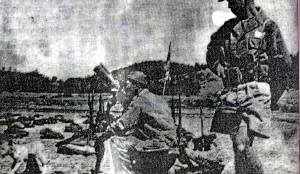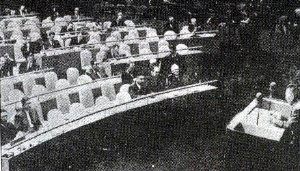Efforts within the Framework of the United Nations and International Cooperation
Since regaining independence, Myanmar had made strenuous efforts to suppress narcotic drugs with her own resources. On 11 February 1948 immediately after independence, the Department of Social Welfare convened a meeting on the question and decided to
eliminate all forms of opium consumption in the country within 5 years and made plans to implement the decision. However, even in initial stages, difficulties were encountered in implementation due to internal insurrection
,financial restraints and principally due to Kuomintang aggression in some border areas of Myanmar.
The Kuomintang forces encroached into Myanmar and, with the professed aim of launching offensives against the People’s
Republic of China from bases in Myanmar, resorted to poppy cultivation, production and trafficking of opium to finance
their military expenses. The Government of the Union of Myanmar, therefore, was constrained to bring the matter up to the United Nations Organization and submitted a formal complaint on 25 March 1953. On 17 April 1953, Justice U Myint Thein, Chairman of the Myanmar Delegation presented to the United Nations General Assembly a full picture of the events that had taken place leading to the aggression.
Pursuant to the United Nations General Assembly resolution adopted on the complaint, military leaders from the United States, Thailand, Myanmar and the Republic of China met at the United States Embassy in Bangkok on 22 May 1953 and discussed the evacuation of the Kuomintang troops from Myanmar. This led to the withdrawal of about 2000 Kuomintang troops from Myanmar in
November and December 1935. Over 7000 Kuomintang troops withdrew in 1955-59.
Despite those significant figures many Kuomintang troops opted to say behind on
Myanmar territory and zealously took up poppy cultivation, production and
trafficking of opium.
 |
 |
| KMT
invaders troops undergoing training with the assistance of American instructors. |
Leader
of Myanmar delegation U Myint Thein presenting with firm evidence the case of KMT aggression into Myanmar at the UN General Assembly. |
Visit of the Executive Director of the
UNDCP and Visit of UNDCP Technical Mission
A technical mission of the UNDCP visited Myanmar from 25 March to 5 April
1998 and made a tour of areas in Shan State and Kachin State with a view to drawing
up a strategy on the elimination of poppy cultivation in Myanmar within 10 years. To
be able to submit the findings of the technical mission to 20th Special Session
of the United Nations General Assembly on Narcotic Drugs, Mr. Pino Arlacchi,
Executive Director of the UNDCP paid a visit to Myanmar from 11 to 15 May 1998.
While in Myanmar he called on Secretary I of the State Peace and Development
Council and had a frank and cordial discussion on current narcotic drugs
suppression efforts of Myanmar, alternative development and substitute crops
cultivation. On the same day, he met with U Ohn Gyaw,
Minister for Foreign Affairs and Vice-Chairman of the Central Committee for Drug
Abuse Control. The delegation led by Mr. Arlacchi and the departmental heads led
by Colonel Soe Win, Director-General of Myanmar Police Force and Secretary of
the CCDAC discussed measures taken for narcotic drugs eradication.
Accession to United Nations Conventions on Narcotic
Drugs.
Myanmar acceded to the Single Convention on Narcotic Drugs, 1961 on 29 July
1963, and acceded to the Convention on Psychotropic Substances,1971 on 20 June
1994 Myanmar became a Signatory to the Convention Against Illicit Traffick in
Narcotic Drugs and Psychotropic Substances, 1988, with reservations on Article 6
concerning extradition and Article 32 (2),(3) on settlement of disputes.